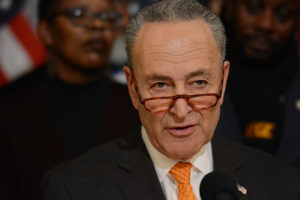The Senate on Wednesday approved a $280 billion bill package with a bipartisan 64 to 33 vote that includes $52.7 billion to bolster domestic semiconductor manufacturing capacity and $200 billion for science and technology efforts aimed at improving competition with China.
Following Senate passage, President Biden urged the House to “pass it ASAP,” with the lower chamber likely to consider the compromise legislation as early as Thursday.

“I took a moment today to watch the Senate pass the CHIPS and Science Act, a bipartisan bill that will accelerate semiconductor manufacturing in the U.S. It will lower prices, create jobs, and – critically – decrease our reliance on imported chips,” Biden wrote in a social media post.
Senior Pentagon leaders over the last several months have urged action on the legislation, which has taken many forms over the last couple years, to help address semiconductor shortage challenges and ensure the department has access to the microelectronics required for major capabilities.
During a White House event on the legislation on Monday, Deputy Defense Secretary Kathleen Hicks called semiconductors “the ground zero of our tech competition with China” and said the department is highly dependent on microelectronics for capabilities such as the F-35, nuclear weapons, quantum computing, artificial intelligence, hypersonics and 5G.
“We’re not the only ones focused on this challenge; of course, China is also focused on this challenge, and today approximately 98 percent of those commercial microelectronics that DoD is so dependent on are assembled, packaged, and tested in Asia,” Hicks said. “The [CHIPS and Science Act] will help us substantially return leading-edge microelectronics to the United States; deliver a winning combination of design, system integration, and manufacturing.”
The $52.7 billion in the “CHIPS” portion of the legislative package specifically includes $39 billion to expand and improve domestic semiconductor manufacturing capacity, covering $19 billion in fiscal year 2022 of which $2 billion would go toward legacy chip production, followed by $5 billion annually from FY ‘23 to ‘26.
The bill also includes $2 billion for chip production related to DoD-unique requirements, $11 billion for microelectronics research and development and steps to bolster the workforce and a 25 percent investment tax credit covering manufacturing of semiconductors and associated equipment in the U.S.
The $200 billion for science and technology initiatives includes $81 billion for the National Science Foundation, $10 billion for the Department of Commerce to go toward establishing regional technology hubs and $68 billion for Department of Energy efforts.
Senate Majority Leader Chuck Schumer (D-N.Y.), who has led the legislative effort, called the bill “one of the largest investments in science, technology, and manufacturing in decades,” while noting that additional provisions not included in this compromise package may still come together from continued conference negotiations into September.
“Now of course, while this bill contains many critical investments in chips and scientific research, there are other major proposals from both sides that are still in the works within the conference committee,” Schumer said on the Senate floor on Wednesday. “That important work must continue, it will continue, and it is my intention to put the Conference Committee bill on the floor in September after their work is complete.”
All 33 votes against the bill were cast by Republicans and Sen. Bernie Sanders (I-Vt.), who said “there is no doubt that there is a global shortage in microchips and semiconductors” and that he “fully supports efforts to expand U.S. microchip production” while calling the measure a “blank check” for microelectronics manufacturers.
“But the question we should be asking is this: Should American taxpayers provide the microchip industry with a blank check of over $76 billion at a time when semiconductor companies are making tens of billions of dollars in profits and paying their executives exorbitant compensation packages? I think the answer to that question should be a resounding no,” Sanders said in floor remarks on Monday.